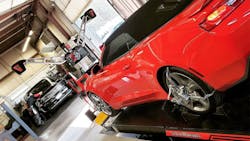Should you add wheel alignment to your shop?
Modern vehicles require regular alignments to minimize tire/suspension wear and to maintain an overall safe, secure driving experience. Quality wheel alignment machines perform alignments quickly and efficiently, so shops can enjoy an additional, sustainable, repeating revenue source that leads to higher levels of customer satisfaction and repeat business.
A wheel alignment machine can be a big investment. However, without a wheel aligner on site, service facilities may be losing out on an important revenue stream. There are a variety of aligners available to meet the unique needs of every shop. To properly equip your service facility with the right wheel alignment machine, answering the following questions will help you decide if an aligner is a good investment and what type of aligner will help maximize revenue.
- How much space do you have for an aligner?
- What types of vehicles does your shop typically work on, i.e. consumer, heavy-duty commercial, emergency, etc.?
- What level of training and skill level do the service technicians have?
- What type of return on investment are you looking for?
- What features are the most important to your business?
Today’s modern vehicles come equipped with Advanced Driver Assistance Systems (ADAS) like lane-keeping assist and emergency braking. ADAS systems rely on sensors, cameras and other devices to maintain vehicle position in response to driver inputs. Without proper wheel alignment, ADAS systems may not react, or may overreact, leaving drivers at risk. With ADAS work on the rise, this feature has become an important consideration for shops, including those adding or increasing wheel alignment capabilities.
In addition, you may want to check if the alignment equipment you are considering has OEM approval. No one knows a vehicle better than the manufacturer who made it. Original equipment manufacturer (OEM) approval means that a wheel alignment machine has been certified by the vehicle manufacturer to properly measure its unique vehicles to a certain level of accuracy. This third-party approval ensures that the wheel aligner meets certain stringent requirements.
One of the biggest challenges with integrating a wheel aligner into a shop is crucial shop floor space. Wheel aligners are traditionally large machines, but thanks to advances like imaging 3D technology, alignment equipment is more compact and more accurate than ever before. Many models are also highly mobile, which means that the user has the option to roll the wheel alignment equipment away when it is not in use.
Whether you are looking for a high-level, drive-through style machine with automatic lift tracking or a more compact, wireless design that’s perfect for a shop with limited floor space, it is a good idea to look to a brand that has a long history of building industry-leading wheel alignment machines that merge modern technology with traditional durability and precision. For example, John Bean has developed a range of wheel alignment equipment to meet the diverse needs of automotive service professionals.
Information provided by John Bean.
About the Author

